Hello, fellow lovers of all things green,
One of the joys of doing what I do as a Landscape and Garden Designer is working with special folks with unique properties, many with garden dilemmas that I see as opportunities, like James of Sparta, NJ, who lives on a mound of massive moss rocks. The foundation sits atop monster boulders. His home beautifully complements the natural surroundings with a sleek metal roof, creamy white trim, and an earthy green façade.
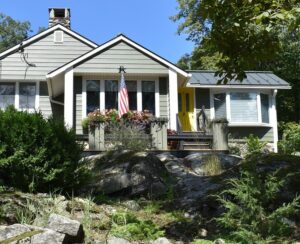
“After” – Garden Design by Mary Stone, Stone Associates Landscape Design & Consulting.
When I first saw the setting, I envied his moss rock. Moss, a bryophyte, is the oldest land plant on Earth for over 400 million years! And I’m drawn to boulders, especially massive ones, which may be related to my last name (smile). Not to mention, stone is the only deer-proof thing in Sparta.
Uncovering Pockets Beneath Landscape Fabric
The gardens were covered in landscape fabric, which inhibited moisture from penetrating soil and encouraged plants to have shallow roots. However, landscape fabric does not prevent weeds because mulch and debris break down. While removing the fabric, we assessed root space for planting pockets and happily found plenty.
Alpine gardens mimic what we see in high elevations and frequently have gravel beds amongst hefty stones. The plants can handle poor shallow soil, often sandy, but with good drainage. I envisioned James’ alpine garden with swaths of plants to create visual movement cascading down the front boulders into a pool of a lawn alternative below.
Deer-Resistant Plants to Create a “Stream” of Movement
While I thought Bambi would have a tough time maneuvering the boulders to munch my proposed garden, I stuck with deer-resistant plants such as sun-loving Snow in Summer (Cerastium) with puffs of white flowers, Creeping Phlox (Phlox subulata) carpeting rocks in brilliant pinks and purples in spring and Hens-and-Chicks (Sempervivum) that come in many shapes and sizes and adorably tuck in nooks and crannies as do Stonecrop (Sedum).
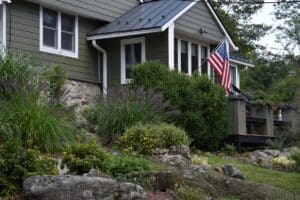
“After” – Garden Design by Mary Stone, Stone Associates Landscape Design and Consulting.
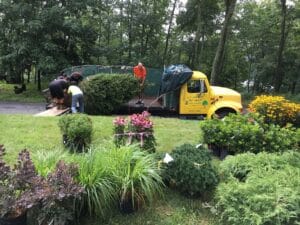
Welcome Plants!
There’s the tiny maroon and green beauty Sedum serpentini and Sedum sexangulare, which turns copper in intense sun and has bright yellow flowers
in late spring. And, of course, Creeping Thyme, specifically Thymus praecox’ Coccineus,’ will have a place in the tapestry of foliage. I included ornamental grasses for texture and interest, such as the ambitious Blue Fescue (Festuca glauca) with pops of Fountain Grass (Pennisetum alopecuroides).
For the shadier spots, there’s Deadnettle, Lamium maculatum ‘Pink Pewter,’ one of my favs, and many unusual varieties of Bugleweed such as Ajuga’ Chocolate Chip,’ which can also take the sun.
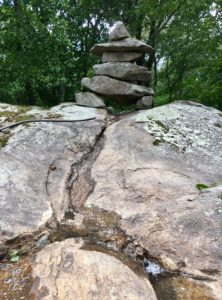
An Inuksuk Water Feature Underway
An Inuksuck Straddles a Ribbon of Water
James built a water feature that meandered through the boulder formations with an inuksuk straddling the crevice of a narrow ribbon of water using a garden hose. An inuksuk is an artful stack of rocks in the form of a person. We added a permanent water feature to enhance James’ great idea, installing a 300-gallon reservoir to increase the water flow and drama. Mother Nature intensified!
In the fall, we planted a lineup of 500 deer-resistant spring blooming bulbs in a purple and yellow theme you can read about in Deer-Resistant Spring Blooming Bulbs. New to me is Fritillaria (Fritillaria-persica), which creates an unusual structure in mid-spring with striking clusters of dark purple bell-like flowers that rise 2-3 feet.
“They’re cool looking, but the ‘skunk-like fragrance’ may be a bit distracting. Shall we try a few? Promise I won’t put them by your front door :^)”
James, the adventurer, writes back, “They all look great, Mary! I love the purple flowers and, of course, the yellow daffodils (to match the newly painted bright yellow door). I’m not worried about the skunk smell. Maybe it will encourage deer to avoid my yard entirely!”
Garden Dilemmas? AskMaryStone@gmail.com and your favorite Podcast App.
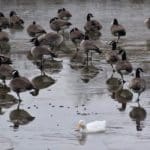
With acceptance, we can all live together peacefully.
A Story of Acceptance:
I’m still giggling about James accepting the skunk smell and finding its positive side. Speaking of, one of the things I enjoy hearing in early spring is the migration of Canada geese* returning home though many spend winters here, much to the chagrin of office complexes and golf courses that provide perfect environments for them to stay.
I feel the energy and their sounds as a crescendo through the sky like the glorious energy of the upcoming season of growth unfolding, inspiring us to contribute our energy to nurturing our dear Earth. Whether you garden or not, observe the beauty and rhythm of nature, except all parts of it, because we are all part of nature. We are all one, and the cycle never ends.
(*A friend who lives in Canada corrected me that they are not Canadian geese. They are Canada geese, and their name comes from their scientific name, Branta Canadensis, but they’re native to many habitats in North America, not just Canada.)
Enjoy more of the story in the Garden Dilemmas Podcast (@10 soothing minutes):
Links to related stories you’ll enjoy:
Deer-Resistant Spring Blooming Bulbs


